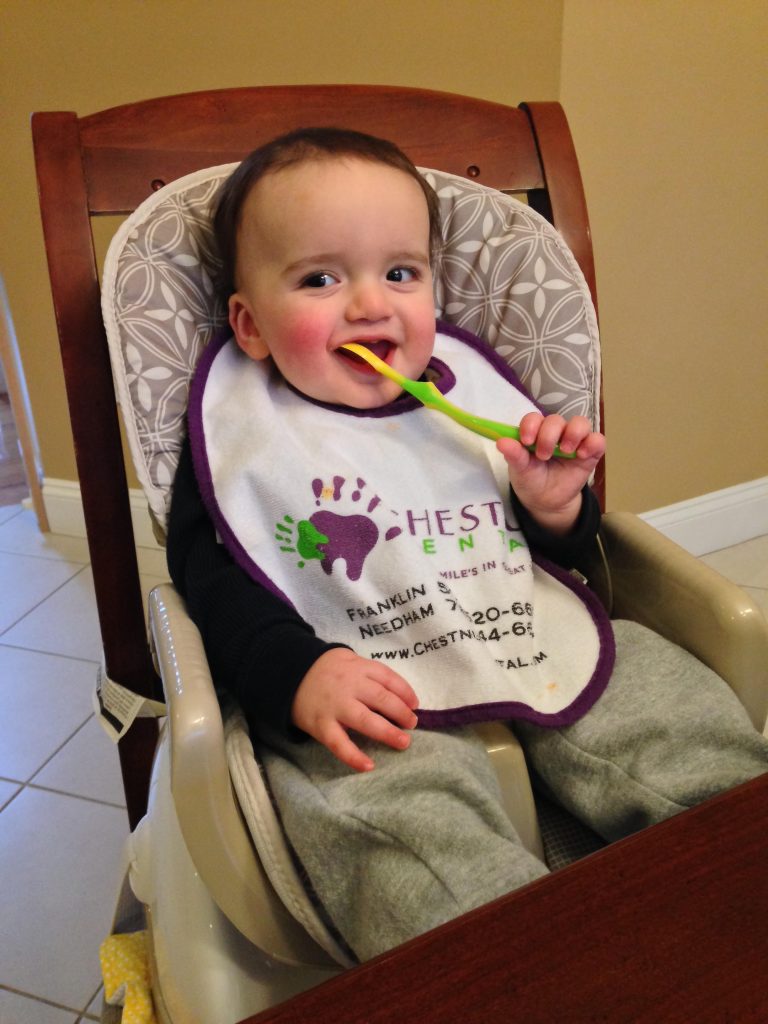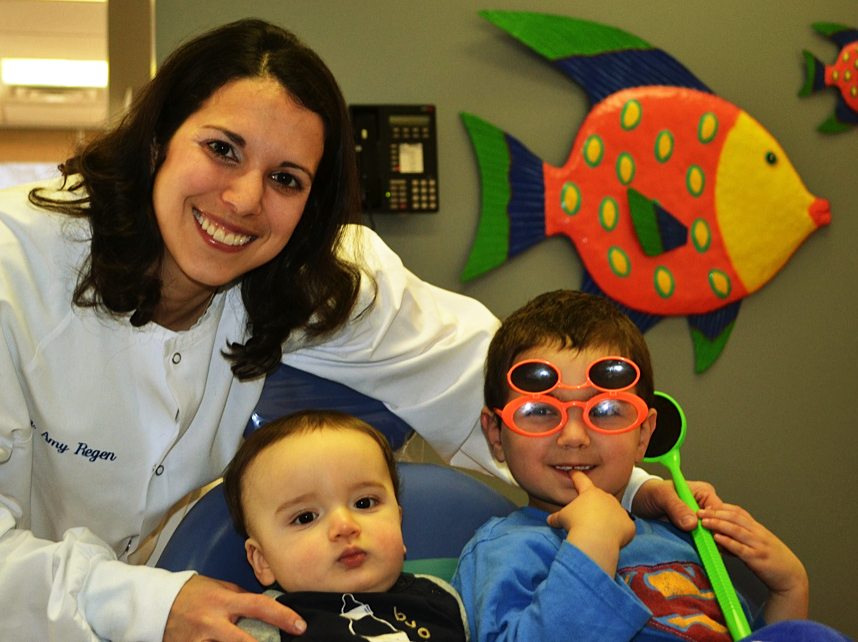What Moms Need to Know About Baby Teeth
A friendly guide from moms and pediatric specialists at Chestnut Dental
From One Mom To Another
Hey there, fellow mama. We get it — there’s a lot to juggle when it comes to raising little ones, and dental care might not be top of mind (yet). But here’s the thing: early dental care can make a huge difference in your child’s health, confidence, and development.
At Chestnut Dental, many of us are moms ourselves — and we’re here to walk alongside you. Our team of pediatric dental specialists, orthodontists, and family-focused staff provide expert care in a welcoming, kid-friendly environment. Whether you’re prepping for your baby’s first tooth or wondering if it’s time for braces, we’re here to help every step of the way.
As moms, we all want to give our kids the healthiest start possible — and that includes caring for their teeth, even before they can say “toothbrush.” The good news? A few simple habits and some expert support can go a long way. Whether you’re navigating teething or scheduling that first dental visit, here are the key things to know about your child’s oral health from day one.
1. Baby Teeth Matter More Than You Think
You might be surprised to learn just how important those tiny baby teeth really are. They’re not just “placeholders” — they play a big role in:
- Speech development — helping your child pronounce sounds correctly
- Chewing and nutrition — ensuring they eat a variety of healthy foods
- Guiding permanent teeth — holding the space for their grown-up smile
- Establishing healthy habits — early routines set the stage for lifelong dental wellness
Bottom line: taking care of baby teeth is a big deal. But don’t worry — we’re here to make it easy.
2. Your Child’s First Dental Visit: Why Age One Matters

The American Academy of Pediatric Dentistry recommends a child’s first dental visit by age one — or within six months of the first tooth erupting. Here’s what to expect:
What Happens at the First Visit?
- This is like a “well visit” to the pediatrician. It is a time for our dental team to teach you how to take care of your little one’s mouth and what to expect at each step of the way.
- A dentist will perform an exam, usually done as a “lap-to-lap exam” with you holding your little one.
- A cleaning and fluoride application, if appropriate, may be performed.
- A caries risk assessment is performed and you will be given personalized tips on brushing, teething, and toddler nutrition.
Why Age One?
- It helps with early cavity detection and prevention.
- Cavities are the most common chronic disease of childhood, more than four times as prevalent as asthma – greater than 50 percent of children experience caries in their primary teeth.
- Starting oral care early can help prevent cavities and allows for conservative management technique.
- It establishes a dental home for your child. A dental home is not only a place you can turn to for all your child’s dental needs, but by starting early it lets your child gain trust and familiarity in the dental setting.
- It reduces dental anxiety down the road — starting early establishes a safe environment for your child.
3. Signs of Teething & What You Can Do
Is your baby suddenly cranky, drooling, and chewing on everything in sight? Welcome to teething!
Common Signs:
- Lots of drool
- Irritability or fussiness
- Swollen, tender gums
What Helps:
- Gentle gum massages with a clean finger.
- Pediatrician-approved systemic pain relief if needed, such as Motrin or Tylenol.
- Over-the-counter topical analgesic medicines (like Orajel / benzocaine products) are NO LONGER RECOMMENDED due to potential toxicity and adverse reactions.
We’re always happy to check in if you’re not sure what’s normal or need a little reassurance.
4. Fluoride, Toothpaste & Daily Habits
Safe Brushing Starts Early
- Use a rice-sized smear of fluoride toothpaste when the first tooth appears.
- Brush gently twice a day with a soft-bristled baby toothbrush.
- Best times to brush are in the morning and before bed.
- The last thing to touch the teeth at night before bed should be the toothbrush with a smear of fluoride toothpaste.
Cavity Prevention Tips:
- Avoid sending your child to bed with a bottle, especially containing milk or juice. Going to bed with milk or juice places your child at an increased risk for cavities.
- Limit sugary snacks and sticky treats – it is all about the frequency of exposure. Limiting grazing and frequent snacking can help with caries prevention.
- Offer water between meals, which is not only good for the body, but helps to rinse the mouth and reduce bacteria buildup.
These small habits make a big impact — and we’re here to guide you as your little one grows.
5. Your Child’s First Orthodontic Checkup: Age Seven
You read that right: the first orthodontic checkup should happen around age 7, even if your child still has baby teeth. Why?
At This Stage, We Can:
- Assess jaw growth and see how the bite is developing.
- Spot potential issues like crowding or crossbites early.
- Recommend interceptive treatments if needed (sometimes avoiding braces altogether later!).
What the Visit Looks Like:
- A relaxed, no-pressure exam by our orthodontist.
- Dental radiographs if necessary, to see how the adult teeth are positioned and developing.
- A custom care plan that includes discussing the right time for your child to begin treatment, or a plan for monitoring your child’s growth and development.
6. Dental Concerns: When Should I Worry?
You know your child best — but here are a few signs it’s time to call us:
- Brown or white spots on the teeth (could be early signs of decay or can be a sign of enamel issues)
- Tooth pain or sensitivity to hot/cold
- Any injury to the mouth or teeth
- Prolonged habits like pacifier or thumb-sucking beyond age 3
- Baby teeth falling out too early or too late
We always welcome questions. There’s no such thing as a silly concern when it comes to your child’s health.
Building Confidence Through Comfort
At Chestnut Dental, we know that great care is about more than just clean teeth — it’s about how your child feels at every visit. That’s why we’ve designed every aspect of our practice to make children (and their parents) feel welcome, understood, and supported. With multiple specialists under one roof — from pediatric dentists to orthodontists and general adult dentists — your family receives coordinated care in one convenient place. Our kid-friendly spaces are designed to put children at ease, and our team includes moms and professionals who truly understand what it’s like to care for little ones. We treat every child like one of our own — because we’ve been in your shoes.

Let’s Grow Smiles Together
Families choose Chestnut Dental because we combine expertise with warmth. With three conveniently located offices in Needham, Franklin, and Bedford, we’re here when and where you need us. Our board-certified pediatric and orthodontist specialists are committed to providing gentle, personalized care that meets your child’s needs — whether it’s their very first dental visit or a smile checkup at age seven. And with flexible scheduling and a team that genuinely cares, we make it easy for your whole family to stay on top of oral health — together.
Is Your Child Ready For Their First Visit Or Smile Checkup?

Let’s make it easy — and even a little fun.
Schedule an appointment today and experience the Chestnut Dental difference.
Let’s grow healthy smiles together — from baby teeth to big-kid grins and everything in between.

